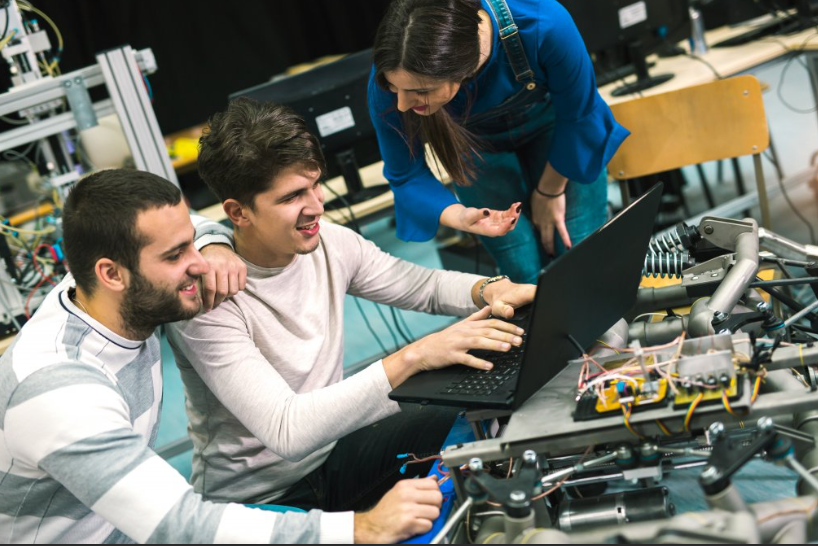For engineering students, it is essential to have a dependable and potent laptop. If you are studying computer science, electrical engineering, or civil engineering, your laptop is your main instrument for research, modelling, coding, and other tasks. Engineering students must make a critical choice when choosing a laptop because they will use it as their main tool for many jobs during their academic careers.
These are the main things to think about when selecting the best laptop for engineering students before diving into the top laptop model recommendations.
Performance:
- One crucial element is the CPU (Central Processing Unit). Seek for a potent CPU, such as an AMD comparable or an Intel Core i7. It is necessary for the efficient operation of resource-intensive engineering software.
- Multitasking and having enough RAM (16GB or more) are essential for handling big datasets or simulations.
- For applications that require a lot of graphics processing, such as 3D modelling and simulations, a dedicated GPU (Graphics Processing Unit) like NVIDIA Quadro or GeForce RTX guarantees excellent performance.
Display:
- To display intricate engineering models and designs, a high-resolution screen is required. Generally, a Full HD (1920×1080) resolution will do, but for better clarity, think about 4K screens.
- For jobs involving visual data processing, a colour-accurate display is essential for ensuring that graphs and charts are represented accurately.
Battery Life:
To facilitate on-the-go tasks like taking notes during lectures or working in locations with restricted access to power outlets, engineering students frequently require laptops with good battery lives (6–8 hours or more).
Operating System:
- Software compatibility influences the choice of the operating system. For optimal compatibility, opt for a Windows laptop, as the majority of engineering programs are made for this operating system.
- But if you’re more of a macOS or Linux user, be sure it works with the apps you need, or be ready to use emulators or virtualization solutions.
Durability: Since engineering students frequently carry their computers to different locations, such as labs and project sites, a sturdy build quality is crucial. Make use of laptops with robust, long-lasting builds, like the ThinkPad series.
Cost & Spending Cap: Strive for the greatest specifications, but stay within your means.
Older or reconditioned versions are good choices if you want to get what you need while keeping costs down.
Connectivity: Verify that the laptop includes several connectors, such as USB, HDMI, and Ethernet. As a result, you can connect it to other networks and devices.
A reliable Wi-Fi card is also required for wireless connectivity, particularly while working in shared areas or on campus.
Following are Professional Suggestions for the Greatest Laptops for Students Studying Engineering:
Lenovo ThinkPad X1 Carbon:
This chic notebook boasts a top-notch, incredibly portable configuration. This gadget is highly recommended for engineering students looking for a dependable companion for their mobile computing efforts due to its good keyboard, extended battery life, and sturdy structure.
System of Operation: Windows
Intel i7-core processor
32GB or 16GB of memory
Storage: SSD with 512GB or more
Optional integrated Intel UHD Panel or discrete NVIDIA GPU: A 14-inch 4K IPS screen
Lenovo ThinkPad P Series:
Designed especially for professionals and engineers, the ThinkPad P Series includes the ThinkPad P15 and P17. These laptops for engineering students are perfect for CAD work, 3D modelling, simulations, and other demanding jobs because of their strong speed, high-quality GPU options, and vibrant screens.
System of Operation: Windows
Processor: Xeon or Core i7 from Intel
32GB or 64GB of RAM
Storage: SSDs with at least 1 TB
NVIDIA Quadro graphics
4K display measuring 15.6 or 17.3 inches
Lenovo Legion 5 Pro:
Although the Legion series is largely intended for gamers, engineering students who need high-performance computing may find the Legion 5 Pro an attractive option due to its potent hardware, which includes AMD Ryzen processors and NVIDIA RTX GPUs.
System of Operation: Windows
The AMD Ryzen 7 or 9 processor
Memory: 32GB or 16GB
Storage: SSD with at least 512GB
NVIDIA GeForce RTX 30 Series graphics
16-inch IPS QXGA (2560 x 1600) display with a refresh rate of 165 Hz
Lenovo ThinkPad L Series (ThinkPad L14, L15):
The Lenovo ThinkPad L Series (ThinkPad L14, L15) provides an economical choice for those studying engineering. It might not perform as well as more expensive models, but it’s a dependable and affordable option for simple engineering jobs.
System of Operation: Windows
Processor: Core i5 or i7 Intel
Memory: 32, 16, or 8 GB
Storage: at least a 256GB SSD
Incorporated or separate GPU rayon GPU
Full HD 14- or 15.6-inch screen
Conclusion:
These professional suggestions ought to assist you in locating a gadget that meets your technical requirements, regardless of whether you’re leaning towards Windows or even a gaming laptop. When choosing a laptop, don’t forget to take into account aspects like processing speed, RAM, storage capacity, and graphics capabilities. Invest in a device that will serve you well during and beyond your time in the college or institute.











